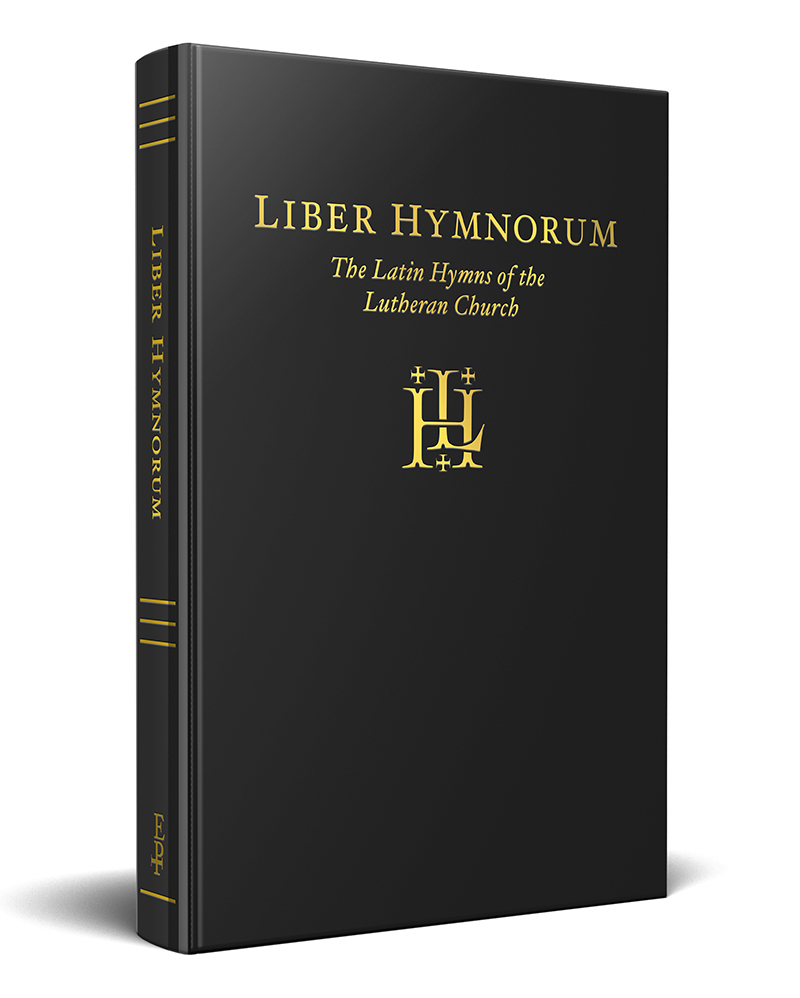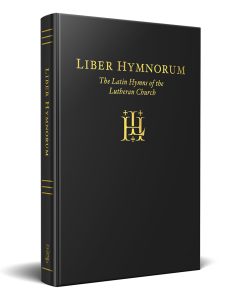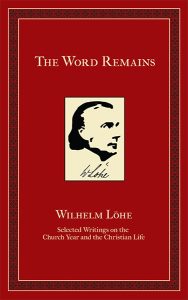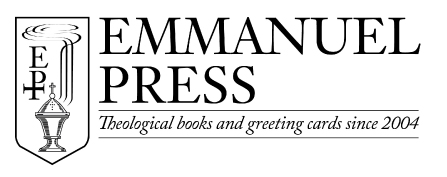THE LATEST NEWS
A quick note about purchasing Liber Hymnorum
Today we received word from our printer that Liber Hymnorum is ready! We’re heading to Ohio tomorrow to pick up the books so that we can have them available at the “Lutheranism and the Classics” conference in Fort Wayne. This has really been down to the wire, but we are thrilled that we can debut Liber Hymnorum with author Matthew Carver in person. The book will be released on this website on Friday, September 30. If you want to know when the page is live, like us on Facebook or sign up for email updates on the right sidebar.
How would Liber Hymnorum be used devotionally?
 “Liber Hymnorum is arranged according to the church year, with the ‘de tempore’ (times and seasons) in the front and ‘de sancto’ (saints and festivals) in the back of each section. This makes use in home or church fairly simple and straightforward. Christians, through these hymns, find expression for their own spiritual sentiments in response to God’s gifts each hour and day and reflect on the themes of the season or feast, tying in with what happens at church. The prayer service hymns (hymns of the daily office, or Liturgy of the Hours) especially can and should be used by Christians at home as well as in those churches where Matins and Vespers are offered. A regular course and use of these ancient hymns anchors the mind and heart to the hours, days, seasons, and all time as God arranges it.
“Liber Hymnorum is arranged according to the church year, with the ‘de tempore’ (times and seasons) in the front and ‘de sancto’ (saints and festivals) in the back of each section. This makes use in home or church fairly simple and straightforward. Christians, through these hymns, find expression for their own spiritual sentiments in response to God’s gifts each hour and day and reflect on the themes of the season or feast, tying in with what happens at church. The prayer service hymns (hymns of the daily office, or Liturgy of the Hours) especially can and should be used by Christians at home as well as in those churches where Matins and Vespers are offered. A regular course and use of these ancient hymns anchors the mind and heart to the hours, days, seasons, and all time as God arranges it.
“The melodies are given in standard notation (resembling the stemless chants found in our modern hymnals) as well as the original Gregorian notation. For those able to read Gregorian notation (a worthy endeavor; not as hard as it looks!), the Latin hymns are completely underlaid, so there is no guesswork in which syllable goes on which note, leaving the mind freer to contemplate the spiritual depths of the text (or at least, to grasp the basic meaning of the Latin!).”
–Matthew Carver: author, editor, and translator
More details about Liber Hymnorum
 We are still finalizing the release date for Liber Hymnorum, but we do have a few more details to share. It is a hardcover book, 342 pages, 6″ x 9″, selling for $35.00.
We are still finalizing the release date for Liber Hymnorum, but we do have a few more details to share. It is a hardcover book, 342 pages, 6″ x 9″, selling for $35.00.
Over the course of the next week, we plan to provide excerpts, more of the interview with author Matthew Carver, and additional endorsements. Today, we offer you his answer to our question regarding the translation and settings:
“The translation came about mainly in two ways. First, since most of the ancient hymns for the prayer services were unchanged when Lutherans incorporated them into their hymnals, I took a similar approach and used the familiar translations we have of those hymns, written by some of the great poets and translators of the 19th and 20th century, such as Edward Caswall, J. D. Chambers, and J. M. Neale. Above all, I tried, where possible, to use those translations which are familiar to Lutherans (and Christians generally) through books such as the English Hymnal and The Brotherhood Prayer Book. At the same time, some of the collection represents an alteration or accommodation to pure Lutheran doctrine. For these, I started with the familiar translations and tweaked those parts which the Lutherans had tweaked, which were not many, to be fair, since the majority of the most ancient hymns appointed for use in the church are doctrinally pure. Additionally, there are several Reformation-period hymns written in Latin by the learned poets and teachers of the day, such as Philip Melanchthon. These were composed to ancient meters and set to ancient melodies (the only new melody here is that for the Latin version of Luther’s “Erhalt uns Herr bei deinem Wort”). And while some of these have been translated into German and from German into English, they have not, before now, been translated directly into English verse to be sung to the same melody. These Reformation-period hymns are thus presented here for the first time for church and devotional use.”
Coming Soon! Liber Hymnorum: The Latin Hymns of the Lutheran Church
 Wherever you fall on the spectrum of Latin — a scholar, a teacher or student of classical education, or a novice — you will find Liber Hymnorum: The Latin Hymns of the Lutheran Church to be an absolute treasure. Liber Hymnorum is two hymnals in one, the first half being English, the second Latin, exactly mirroring the first half in contents and numbering.
Wherever you fall on the spectrum of Latin — a scholar, a teacher or student of classical education, or a novice — you will find Liber Hymnorum: The Latin Hymns of the Lutheran Church to be an absolute treasure. Liber Hymnorum is two hymnals in one, the first half being English, the second Latin, exactly mirroring the first half in contents and numbering.
As author, editor, and translator Matthew Carver explains: “This book is a collection of hymns taken exclusively from Lutheran hymnals and chant-books of the Reformation and post-Reformation era. Specifically, it contains the old medieval Latin hymns which Lutheran churches in various parts of Germany still sang at morning and evening prayer (especially in urban areas with Latin schools) with the original Gregorian chant melodies that they used, here with Gregorian melodies with the Latin, and modern notation with the English. It also includes some other ancient hymns sung at the beginning of the Divine Service as well as some Latin carols. Basically, anything I found in old Lutheran hymnals that was (a) in Latin, (b) set to music, and (c) designated to be sung in church, I included.
“Each half is arranged in the form of a church hymnal such as might be used for morning and evening prayers, with the hymns keyed to different times of day (evening, night, early morning, mid-morning, noon, afternoon), the days of the week, the seasons of the church year (Advent, Christmas, Epiphany, etc.), and Christian festivals of apostles and saints, some more generalized, some for specific saints. After this come the ancient Divine Service hymns for Palm Sunday, Maundy Thursday, Good Friday, Easter Vigil, and Easter Sunday. These are further augmented by Benedicamus hymns (for the end of the prayer services) and the medieval Latin carols, many of which are familiar to us.”
Over the course of the next week, we will be posting excerpts from an interview with Mr. Carver, addressing such questions as to the translation and settings, how and by whom the hymnal can be used, and why Liber Hymnorum is so unique. To stay informed, like us on Facebook or sign up for (occasional) email updates on the right sidebar.
________
“Matthew Carver has once again done an enormous service for the Church by providing for us his Latin-English Hymnal. This work gathers into one the many Latin hymns that shaped our spiritual forebears as they sought to read and understand and proclaim the Sacred Scriptures in the light of the Church’s historic Christological hermeneutic. Now for English speakers, these classic hymns from the early and medieval church that survived well past the Reformation and helped shape the piety of our great dogmaticians and vernacular hymnwriters can be enjoyed in our own tongue and can help shape our own piety.” -Pr. William Weedon, Chaplain, LCMS Director of Worship
“It is refreshing to find, in one volume, respectable translations (many by Neale already familiar) of Latin hymns I have been chanting all my long life. One applauds this labor of love.” -Fr. Pat Reardon, Touchstone Magazine
________
Matthew Carver was born in Long Beach, California, and attended California State University, Long Beach, earning bachelor’s degrees in Classical Civilization and German Studies. He also studied studio arts, receiving his MFA in painting and drawing from San Francisco Art Institute in 2005. His published works include The Great Works of God, Walther’s Hymnal, The Christian Year of Grace (2014) (trans.), and the Saints Catherine & Maurice Daily Lectionary.
A Review of The Word Remains — Pr. Todd Peperkorn
 Pr. Todd Peperkorn has posted a review of our new book, The Word Remains by Wilhelm Löhe, on his blog. Here’s an excerpt, but be sure to visit his website and read the entire thing:
Pr. Todd Peperkorn has posted a review of our new book, The Word Remains by Wilhelm Löhe, on his blog. Here’s an excerpt, but be sure to visit his website and read the entire thing:
“In this little volume the reader will find that nearly every sentence drips with Gospel infused wisdom. I found myself wanting to highlight every page, until I realized that the whole book is worthy of that kind of careful attention….My best suggestion for this work is to buy and read it straight through, so you have a sense of the whole. But then sit back and let the words linger for a time. Take a couple pages a day and drink them in. Don’t be in a hurry. The words will be there and aren’t going anywhere.”
-Todd Peperkorn in his review: A Hopeful Book by an Old Lutheran

Let’s stay in touch! To receive the most current information on our products and new releases, join our email list today!

